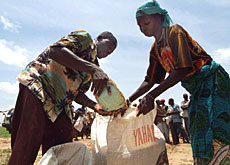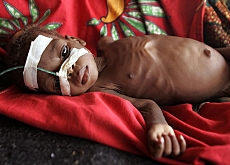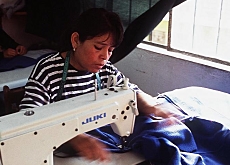Swiss play down reports of Niger “famine”

Swiss aid workers say that food shortages in Niger are being exaggerated in some quarters. But they warn that the crisis is set to continue.
The comments come just days after the United States aid agency, USAid, questioned United Nations figures on how many people were facing the threat of hunger.
Last week Edward Fox, assistant administrator for legislative and public affairs at USAid, cast doubt on a UN estimate that severe food shortages in the African country were affecting 3.6 million people.
He said that “the real danger signs for us are those who are in the category of about 800,000 who will need some sort of food assistance on a direct basis”.
Peter Bieler, head of the Swiss Agency for Development and Cooperation (SDC) bureau in Niger, told swissinfo that it would be wrong to say that the country was in the grip of famine.
“There is a big gap between the reality facing us on the ground and what the international community is saying,” said Bieler.
“Children have been dying every year, but in the last year it has been worse because the harvest was not very good. Niger is experiencing a food crisis, but not a catastrophe or famine.”
He added that the situation would “improve relatively soon because we will have harvest again”.
“But it is important that public opinion takes a long-term view because the problems will probably continue.”
Swiss charity Heks, which works in the central Niger town of Tahoua, also sought to put the problem in perspective.
“There appear to be several positions on this situation,” said spokeswoman Seta Thakur. “We don’t talk about a famine, but of a serious food shortage.”
Accusations
On Tuesday Niger’s president Mamadou Tanja dismissed reports of a famine as “ramblings” and “politics”. He also accused the UN of “shouting and screaming” in order to raise money.
But Bieler said the government in Niger could have done more to alleviate the problems.
“At the beginning of the year the government was increasing tax on food which led to violent conflict,” he said.
“Now they are distributing food, but they are not taking a lead in looking beyond this year’s harvest. There is an absence of proactive leadership that is symptomatic of what is going on here.”
According to Bieler, one million people were originally directly affected by the harvest, but the number has since swollen because food prices have risen to the extent that many more people cannot afford to buy food.
He added that 2.6 million people had been targeted for aid so far, with 1.7 million of those due to receive further help next month.
The SDC has so far contributed SFr832,000 ($662,000) to Niger and will soon send two logistics experts to the country to help distribute food.
UN officials said this week that large-scale emergency rations to families in Niger had begun for the first time since an initial call for aid was made to the international community last year.
swissinfo, Matthew Allen
The UN says around 3.6 million people in Niger – around 28% of the population – are short of food.
USAid says less than one million people need “some sort of food assistance on a direct basis”.
Niger’s president, Mamadou Tanja, claims reports of a famine are “ramblings” and “politics”.

In compliance with the JTI standards
More: SWI swissinfo.ch certified by the Journalism Trust Initiative



You can find an overview of ongoing debates with our journalists here . Please join us!
If you want to start a conversation about a topic raised in this article or want to report factual errors, email us at english@swissinfo.ch.